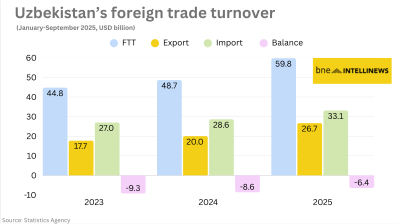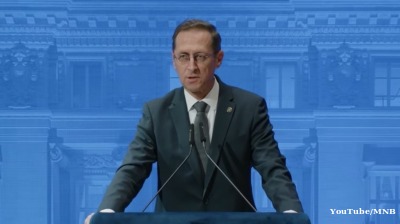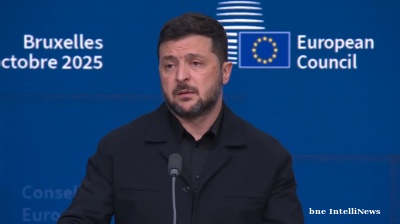Ukraine's international reserves fell by 2.9% in August to $17.232bn taking the level below the three month future import cover considered to be a minimum to ensure the stability of the hryvnia, following a 1.3% decline in July, according to preliminary a statement published by the National Bank of Ukraine (NBU) on September 5.
The result was mainly attributed to repayments of state debt, specifically, Kyiv spent $447.9mn on servicing and paying principal state debt in foreign currency, of which $389.2mn was spent on servicing and redemption on government securities. A total of $607.4mn was transferred by the Ukrainian government and the NBU to the national’s main creditor, the International Monetary Fund (IMF).
In addition the NBU spent some $400mn on forex market transactions to meet demand for dollars from the public, which traditionally take dollars from the market in the autumn. All-in-all Ukraine’s reserves have fall by about half a billion dollars in the last two months and the currency has already slid to UAH28.20 average exchange rate for the first week of September from around UAH26 in previous months.
Despite significant decline in reserves, September's visit of a mission of the IMF indicates that the country is about to secure a deal with the multinational lender over a new $2bn support tranche from a $17.5bn aid loan agreed with Ukraine in 2015. Ukraine commentators are optimistic a deal will be struck, if for no other reason than a deal has to be struck or Ukraine will face a currency crisis as it can’t cover its debt repayment obligations in the autumn with out dipping into its currency reserves again.
According to the IMF's recent statement, the mission will also discuss next steps, including financial assistance from the IMF in support of policies to maintain macroeconomic stability and keep the economy on a path toward sustainable and inclusive growth.
The statement followed the adoption of amendments to the new law necessary for establishing the nation's anti-corruption court, which is a key condition for a new tranche from the support programme.
Alongside the anti-corruption court legislation, two other requirements are demanded by the IMF before it restarts its programme. Specifically, the Ukrainian government should increase the gas price for households, and the finance ministry should take measures to ensure that the 2018 budget deficit will not exceed the planned level of circa 2.5% of GDP.
New IMF funding is crucially important for Ukraine, which is running out of cash and has large bond repayments to make this autumn. Sovereign external debt amortisations are $1.8bn for the rest of 2018 and increase to $3.3bn in 2019 and $3.9bn in 2020 (including bond repayments of $1.6bn in September 2019 and $2.4bn in 2020).
Data

EU rare earth supply dominated by China and Russia - Eurostat
The European Union remains heavily dependent on China and Russia for rare earth imports, with nearly three-quarters of its supply sourced from the two countries in 2024, according to data published by Eurostat and reported by Statista.

Turkey's central bank remains cautious, delivers 100bp rate cut
Decision comes on eve of next hearing in trial that could dislodge leadership of opposition CHP party.

Polish retail sales return to solid growth in September
Polish retail sales grew 6.4% year on year in constant prices in September, picking up from a 3.1% y/y rise in August, the statistics office GUS said.

Uzbekistan’s nine-month foreign trade nears $60bn
Export growth of 33% and import expansion of 16% y/y produce $6.4bn deficit.

.png)


